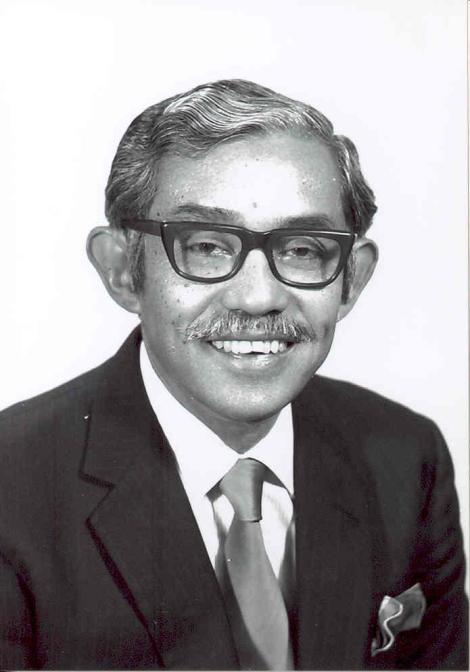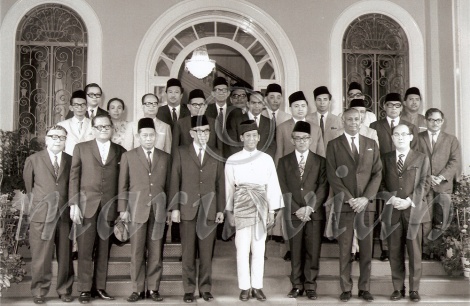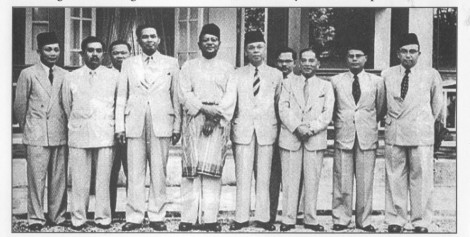Remembering Tun Dr. Ismail the nationalist

Standing tough on laws where many felt ‘unjust’, ‘draconian’ and ‘violate human rights’ like ISA and EO where the interest of majority and internal security is paramount was more valuable to him, much more the his own popularity or how the public feels about him. That is the trait that earn him a lot of respect.
Big Dog dot com
It has been exactly 40 years since Deputy Prime Minister and Home Minister Tun Dr. Ismail Abdul Rahman was called back to Allah s.w.t. His demise was a shock to a nation in recovery mode.
He was a made of principle and stickler to rules and regulations. He tolerated no concession.
Probably because of his training as medical practitioner. He was the first Johoeran Malay who graduated in medicine from Australia.
He was also a staunch nationalist. When Tunku Abdul Rahman accepted the leadership as the President of UMNO upon the untimely resignation Dato’ Onn Ja’far in 1951, the former’s initial reaction was to work on getting the Johorean Malay support. It was pertinent as many Johorean leaders played pivotal role in the incorporation of the nationalist party.
Hence, Tunku insisted that Dr. Ismail and his brother Suleiman were brought into the side of majority of the nationalist Malays, instead of remain loyal to Onn.
It was great political calculated move. Johorean Malays’ strong support became one of the important pillars of UMNO, to carry on. As such, the unity amongst the Malays under UMNO became its powerful political force. The nationalism cry of “Hidup Melayu” was changed to “Merdeka” there after.

Second Prime Tun Abdul Razak’s Cabinet. Tun Dr. Ismail then was the deputy Prime Minister and Home Minister
Although Dr. Ismail was supportive of working with MCA and MIC to achieve a common political objective, he was very critical when MCA was allocated 29% of the 52 seats Alliance Party was contesting in the 1955 Federal Consultative Council election becuase the Chinese were only 11% of the eligible voters. However when UMNO accepted the need for the Chinese to be represented as part of process to demonstrate that Malayans are united and ready for self rule, there on Dr. Ismail defended that political formula.
Dr. Ismail’s steadfast political determination was demonstrated when he dared to challenge then the British High Commissioner Harold MacGillivray. When the British High Commissioner Donald MacGillivray met with the Tunku, Ismail, and the MCA’s representative of H. S. Lee, probably out of intolerable paranoia he accused them of playing into the hands of the Malayan Communist Party, which was waging an armed insurgency against the British.
The source of the dispute was that the British High Commissioner had been given the discretion to nominate six seats, in addition to those contested in the elections. Ismail proposed a compromise: the Alliance would support the elections, but only if High Commissioner MacGillivray would consult with the party that won the elections before making his appointments. MacGillivray initially refused, but after finding public opinion against him, backed down.
He was the Minister of Internal Security, a post which had been specifically created for him. In 1962, he was appointed to the portfolio of Home Affairs as well. In these roles, Ismail introduced the Internal Security Act and was in charge of detaining people under the controversial law designed for internal security, which permits detention without trial.
After resigning in 1967, Ismail expressed amazement that he was not “the most hated man in Malaya” for his actions. Although many were critical of the ISA, Ismail believed it was necessary for public order, stating that “Abuse of the Act can be prevented by vigilant public opinion via elections, a free Press and above all the Parliament.”
Read more at: http://bigdogdotcom.wordpress.com/2013/08/02/remembering-tun-dr-ismail-the-nationalist/


